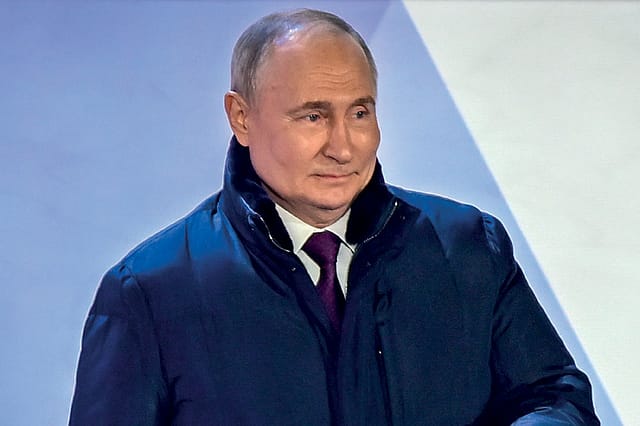Vladimir Putin: Super Tsar

WHAT IS THE significance of Natasha Rostova's dance? In St Petersburg, she would never do what she did on her visit to her uncle's house: give rein to her instincts. "For European Russians, there were two very different modes of personal behaviour. In the salons and the ballrooms of St Petersburg… they were very 'comme il faut': they performed their European manners almost like actors on a public stage. Yet on another and perhaps more unconscious plane… native Russian habits of behaviour prevailed," observed Orlando Figes about that episode in War and Peace. Russia, notwithstanding Peter the Great, never truly became Western. It epitomised, in Western perception, the barbaric East. It remained, in its own worldview, a victim of Western prejudice. Periodically, Russia would become tired of good behaviour among its 'betters' and unabashedly embrace its Eastern soul.
The last time Russia longingly looked West was during the chaos of the 1990s and the earliest years of the 21st century when a relatively unknown former 'spy', a supposed market-friendly liberal, was given the keys to the Kremlin. George W Bush looked into his eyes and found a guy he could trust. And yet, it all went to hell. When Vladimir Putin addressed the Munich Security Conference in 2007, he was declaring war on the West. It was understood only years later. Having just won a fifth term in an election stage-managed and unfair even by the sympathetic yardsticks of the so-called Global South, Putin is set to beat Stalin (29 years in power) by the end of his current term and, if he's around till 2036, as his tailored constitution permits him, he will leave Catherine the Great (34 years) behind too.
Openomics 2026: Continuity and Conviction
06 Feb 2026 - Vol 04 | Issue 57
The performance state at its peak
There were two defining experiences, stark in their imagery, in the making of Vladimir Vladimirovich Putin. The first, by his own account, was when Little Putin stood on the landing of his kommunalka (communal apartments) in then-Leningrad and tried to catch a rat which, of course, threw itself at him: "There, on the landing, I got a quick and lasting lesson in the meaning of the word cornered." The second was on December 5, 1989, when the crowds stormed the East German Stasi's local headquarters in Dresden where Putin and his wife Lyudmila (whom he divorced in 2013) had made themselves a home, much more comfortable than anything life in the Soviet Union would have offered. When some members of the 'mob' headed for the KGB office across the street, a young officer warned them that they were all armed inside and wouldn't hesitate to shoot. But when that young officer called for a Red Army tank unit, he was told: "We cannot do anything without orders from Moscow. And Moscow is silent."
Everything Putin has said and done for most of his 24 years as president, prime minister and president again has been framed, and justified in his eyes, by these two experiences. Autocrats can't survive without creating and then cashing in on paranoia. To look ahead, they first look back. Through it all, Putin has seen to it that Moscow would not be silent.
Violence has been the hallmark of his rise and consolidation: whether the mysterious blasts blamed on terrorists shortly before his elevation, the successful Second Chechen War, the annexation of Crimea, or the ongoing war in Ukraine. Or, the bloody deaths of his opponents. After all, the abiding lesson from his street-fighting adolescence was that "you had to land the first punch". A man who sees the Soviet collapse as the greatest geopolitical disaster of the 20th century, isn't joking when he talks about NATO—at its strongest ever with the addition of Finland and recently Sweden and capable at last of blocking Russia in the Baltic Sea—and World War III. But Putin, too, is afraid of that war.
Proclaiming a "social consolidation" behind his presidency on March 17 and banking on a war economy set to grow at 2.6 per cent (according to IMF), Putin could be generous to the extent of mentioning Alexei Navalny's death. When 'Mr Moscow' became Mr Russia, he resurrected Homo Sovieticus, albeit without a name. Like the election itself, there may be few surprises for his Western adversaries in the near future. It's those at home who need to watch out. Putin's vote share went up from 78 to 87 per cent in keeping with the steady climb election-to-election. Given that trajectory, the Kremlin may soon decide that Russia aka Putin no longer needs a show of legitimacy. Except that, war economies are fundamentally unsustainable.
